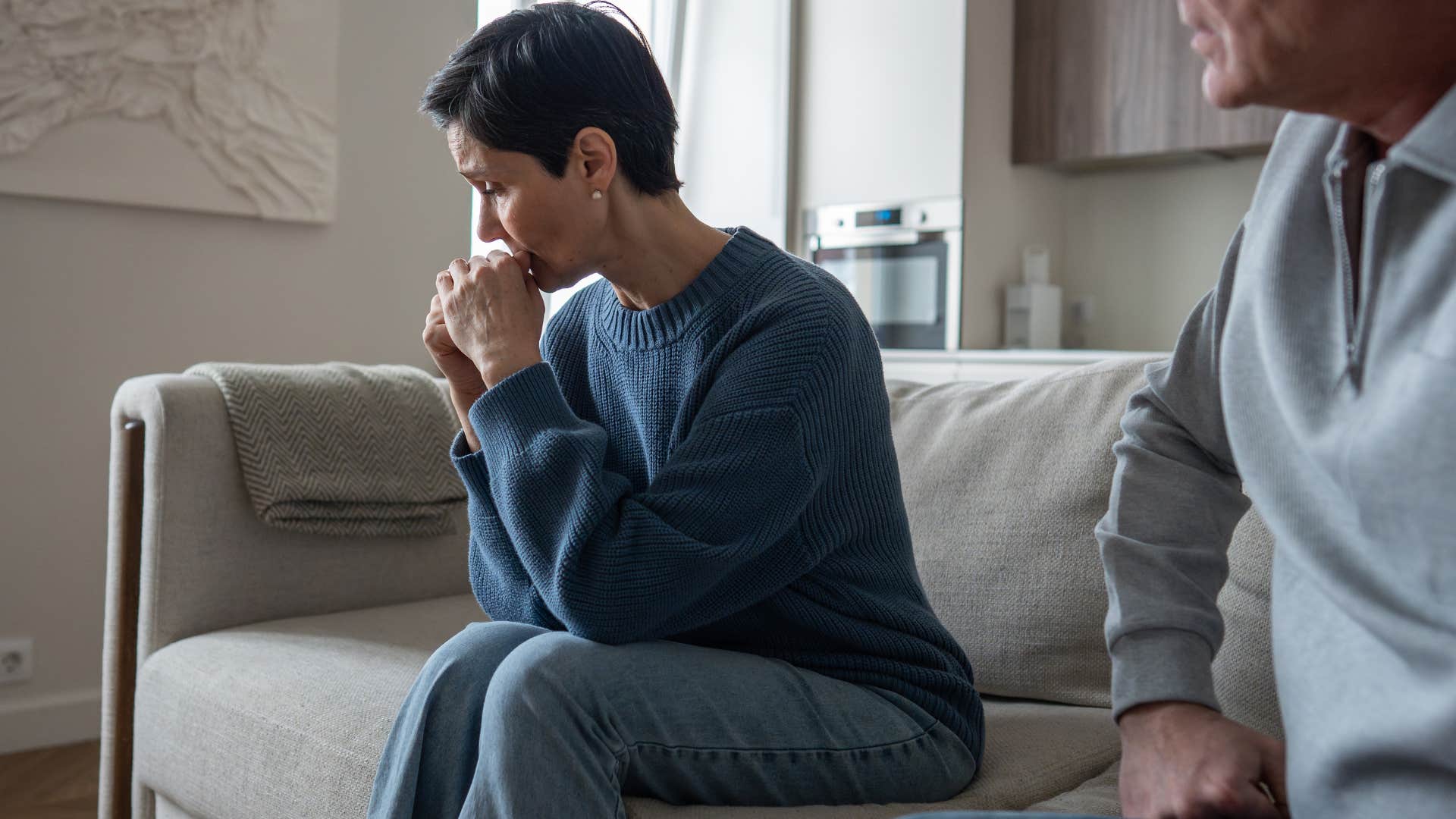People Who Can’t Handle Criticism Always Use These 11 Phrases
They're too afraid of inadequacy to take responsibility.
 Tanja Nikolaenko | Shutterstock
Tanja Nikolaenko | Shutterstock Many people struggle to handle criticism and perceive it as hurtful in many aspects of life — whether it’s coming from a partner, a parent, or even a boss at work — according to a PLOS One study, but their reactions are rooted in their own personal and emotional identities. An inherently insecure person — constantly seeking approval, validation, and attention from others — will respond differently to criticism than someone who’s internally gratified and secure.
It not only shapes the way they respond, but it also shapes the way they digest criticism and move forward. From work environments to intimate relationships, constructive criticism can help people to challenge themselves and grow, but for those who avoid it and turn defensive, it’s destabilizing. People who can’t handle criticism always use these specific phrases — signs that they’re not going to take your advice, learn from their mistakes, or grow in the face of new challenges.
People who can’t handle criticism always use these 11 phrases:
1. ‘It’s just the way I am’
 DimaBerlin | Shutterstock.com
DimaBerlin | Shutterstock.com
People who refuse to take accountability for their mistakes or grow on a personal level often use phrases like “It’s just the way I am” to justify their lack of action. Whether it’s in the face of constructive criticism in the workplace or a partner expressing their concerns, they’d prefer to pretend like they have no control over their lives, behaviors, actions, and personality — rather than taking responsibility.
Like a study conducted by Brigham Young University argues, these kinds of people are often internally insecure — they think that owning up to a mistake is the same thing as admitting failure or defeat. They can’t handle criticism — instead, blame-shifting or staying stagnant in their beliefs — because their world revolves around being praised and uplifted by others.
2. ‘I can never do anything right’
 La Famiglia | Shutterstock.com
La Famiglia | Shutterstock.com
Self-conscious and insecure people often have a certain level of self-awareness, like a study from the Child Psychiatry & Human Development journal argues, but still struggle using it in a positive manner to feed emotional regulation, self-soothing habits, and internal security. They struggle with accepting constructive criticism, mentorship, and challenge, because their whole sense of self revolves around what other people think of them.
If someone points out their mistakes or tries to coach them into growth, it can ruin their whole day and push them into a defensive and insecure mentality. They may even attack and demean themselves, using a phrase like this, to ensure they’re on “the same team” as the person they perceive to be doing to them with feedback.
3. ‘Why do you always target me?’
 Littleaom | Shutterstock.com
Littleaom | Shutterstock.com
Many people clouded by their need for acceptance find it difficult to take responsibility for things and accept criticism from others. Whether it’s constructive criticism in a professional environment or emotional expression from a partner at home, they’re constantly on the defensive — feeling attacked when they’re not being actively praised.
They typically use phrases like “Why do you always target me?” in the face of criticism because they feel personally victimized. Even if someone is simply pointing out areas for growth and trying to push them toward personal improvement, their insecurities tell them a different story.
4. ‘Well, what about what you did?’
 Fizkes | Shutterstock.com
Fizkes | Shutterstock.com
By shifting attention away from themselves and turning on the defensive side of a conversation, people who can’t handle criticism protect themselves from having to deal with discomfort and insecurity. Their entire sense of self-worth revolves around what other people think, so when there’s the slightest bit of criticism or feedback, it’s impossible for them to self-soothe.
They use phrases like “that’s not what I say” or “What about what you did?” to shift attention and blame away from themselves, even at the expense of their relationship and conversation well-being.
5. ‘That’s not what I said’
 Fizkes | Shutterstock.com
Fizkes | Shutterstock.com
By suggesting that someone is misinterpreting them, “twisting their words,” or blaming them for things they didn’t do with constructive criticism, insecure people shift the blame in conversations. They’d prefer to paint someone else out to be the perpetrator — and themselves the victim — simply to avoid accountability, taking control of their own life, and leaning into discomfort for the sake of growth.
They’re afraid of looking weak or losing control in situations where they admit to blame or being “wrong,” so they instead push themselves as far from criticism as possible — whether that’s with blame-shifting, defensiveness, or other tactics to boost their self-image.
6. ‘This isn’t fair’
 Fizkes | Shutterstock.com
Fizkes | Shutterstock.com
Many people who struggle with a sense of entitlement or narcissism — rooted in insecurity and turmoil — struggle with the idea of “fairness” in their lives. They believe that they’re entitled to things and that everyone should conform to their every need, but in reality, life just isn’t fair.
Even the most deserving people face struggles, and the smartest people face accountability — that’s life. However, they still use phrases like “that isn’t fair” to push back against criticism that calls them out, urges them to take accountability, and often sparks a bit of discomfort in their lives.
7. ‘It was just a joke’
 simona pilolla 2 | Shutterstock.com
simona pilolla 2 | Shutterstock.com
While it’s true that jokes and humor can diffuse emotional situations and stressful interactions with others, like a study from the International Journal of Disaster Risk Reduction argues, people who use phrases like this aren’t healthily leveraging humor. It’s often a disguise for their hurtful behavior, lacking accountability, and insecurity — they pretend like people are overreacting or reading too much into their shortcomings to shift the negative focus off of themselves.
It’s a defense mechanism for people who can’t handle criticism — they’d prefer to make other people feel “crazy” or insecure, rather than owning up to where they can grow and take responsibility for their own lives.
8. ‘You’re overreacting’
 Fizkes | Shutterstock.com
Fizkes | Shutterstock.com
People who can’t handle criticism may resort to gaslighting to make other people feel insecure — trying to compensate for their internal emotional turmoil and discomfort. Rather than accepting advice and reaping the benefits of constructive feedback, they use phrases like “you’re overreacting” or “you’re reading into it too much” to protect themselves from needing to take the blame or accountability.
They don’t trust themselves or think highly of their skills, capabilities, and competencies, like a 2023 study suggests, so they feel pressured to shame others and put the blame on them to cope.
9. ‘This is why I don’t talk to people’
 Chay_Tee | Shutterstock.com
Chay_Tee | Shutterstock.com
Many people who can’t handle criticism always use these phrases to craft a victim mentality for themselves. Rather than make space for constructive criticism, walk away from unproductive feedback, and take accountability, they’d prefer to place the blame on other people — painting themselves as a victim without the power to change things themselves.
“This is why I don’t talk to people” or “Nobody likes me” are perfect examples of this victim mentality phrases — they’re intended to make other people back-track, feel bad for being honest, and protect the feelings of someone that could benefit from a bit of discomfort and change.
10. ‘I can’t help it’
 Bearfotos | Shutterstock.com
Bearfotos | Shutterstock.com
Instead of taking in another person’s constructive feedback or setting boundaries with unnecessary judgment, people who can’t handle criticism use phrases like “I can’t help it” to rationalize. Rather than acknowledging where they have room to grow and ingesting someone else's feedback, they rationalize and try to justify away criticism — making up for their internal fears of rejection and inadequacy.
Like psychology educator Kendra Cherry argues, these people’s self-esteem is shaky and over-reliant on other people’s praise to maintain, so they rely on defensive mechanisms like rationalization to avoid feelings of discomfort and insecurity.
11. ‘Nobody else thinks that’
 Prostock-studio | Shutterstock.com
Prostock-studio | Shutterstock.com
People who are insecure and constantly seeking validation struggle with accepting feedback because they view mistakes and shortcomings as failures. They believe that accepting another person’s criticism or at least hearing them out will isolate them from other people and encourage people to think less of them — even if the opposite is true.
Phrases like “nobody else thinks that” and “you’re the only person who’s ever said that,” especially in a room of people, are a means for seeking the external validation they’re yearning for. By turning themselves into a victim and trying to seek comfort from others — rather than internally by themselves — they feed into cycles of insecurity, while still ignoring the productivity of constructive criticism.
Zayda Slabbekoorn is a staff writer with a bachelor’s degree in social relations & policy and gender studies who focuses on psychology, relationships, self-help, and human interest stories.

